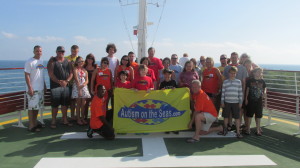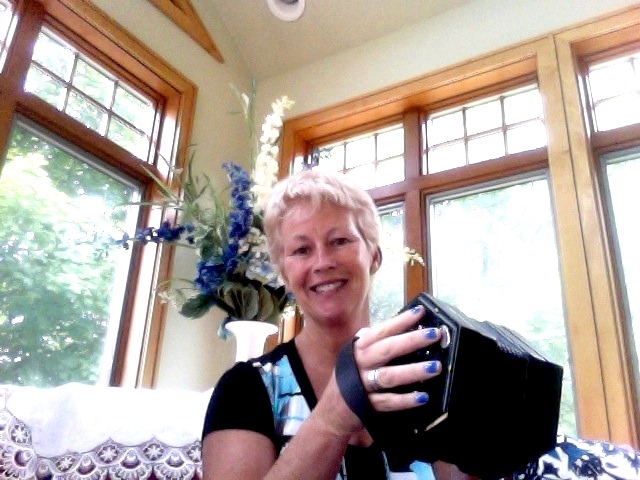Broadway theater-goers endured a delectable dose of envy last year when a full house of autistic persons and their caregivers took over the Minskoff Theatre in New York City for a private performance of “The Lion King.”
That “Hakuna matata”-filled afternoon ”“ sponsored by the Theatre Development Fund ”“ while a headline-grabber, was not alone in enriching the lives of the autistic and their families. For seven years, a Shelton-based company called Autism on the Seas has successfully sent autistic clients and their families and caregivers on “dozens and dozens, not quite 100” cruises.
Autism on the Seas”™ principal Mike Sobbell, 49, did not originally plan to build a company based on travel for individuals with challenges. But, he said citing an academic history in engineering, sociology and psychology, “I had an innate interest.”

He and his wife and two children had enjoyed cruise ships in general. Sobbell, ever an engineer whose first business path was in manufacturing, confesses to a fascination for the structure and propulsion of big boats. His original plans for a generic cruise company eventually morphed into Autism on the Seas.
He could not have chosen a more appreciative demographic to serve. Sobbell pointed to a page of company testimonials that equally tug at heartstrings and offer hope.
One testimonial read, “I saw my Grandson bloom in ways I have waited to see a long time. It reduced my anxiety over his future. He was truly happy, smiling and more verbal (he only speaks in short word phrases).” Another family worried about their boy heading off in the care of others “because at home he is not left with anyone. But by the second day he was asking to be dropped off at every possible session. He fell in love with your staff and told me he wanted to go home with them. I cannot praise you enough for your services on the ship.” And, “I never thought it would be possible for us to go on a vacation like this with our son. It was so awesome to see him having such a good time.”
Autism cruises have involved as few as four families and as many as 40. The basic equation involves a trained support staffer for every three persons with disabilities. Besides Royal Caribbean, cruise ship companies Celebrity, Carnival and Disney also partner with Autism on the Seas.
March 8 another cruise launched ”“ this one aboard Royal Caribbean, which handles about 80 percent of company business on its 21 ships ”“ for eight families, heading from New Orleans to Key West, Nassau, Bahamas, and a private island resort. Sobbell said all eight families are affected by autism.
“Clients say to us commonly, they didn”™t think it was possible to have a vacation that not only provided the regular things of a vacation, but that gave the parents a break so they could have some alone time,” Sobbell said.
The market is substantial; perhaps 2 million persons with autism in the U.S., with an extended family-and-friend market of five times that.
The cruises are both a hit and a game-changer: 76 percent of families that sign on with Autism on the Seas had not cruised since their child was diagnosed. And 47 percent of those who sign up have never cruised at all. “Those are amazing numbers,” Sobbell said. “If you are a cruise line you”™re loving us.”
Sobbell is upping the effort via the introduction of the travel industry”™s first “Autism Friendly” certification standard and training program for cruise lines, run by Autism on the Seas. Royal Caribbean International is the first cruise line to receive the certification, “thereby assisting with reasonable accommodations for inclusion and participation by guests with autism and developmental disabilities.”
Effective now, Royal Caribbean”™s entire fleet is comprised of the company”™s Bronze Level-certified “Autism Friendly” ships. Bronze-level accommodations include sensory related toys and social stories; autism-friendly modification to youth activities (where appropriate); autism-friendly movies; priority boarding; dietary offerings (including gluten free and dairy free); and several modifications to services for groups of guests with disabilities.
The fleet is expected to achieve Silver Level certification, featuring more staff training, by the end of 2014; Gold and Diamond levels require additional training.
“Offering cruise lines a standard that includes training for their staff to effectively accommodate the needs of the growing and underserved autism community marks a turning point in the travel and cruise industry,” said Sobbell. “Royal Caribbean”™s involvement and initiative to accommodate this community will open the door toward filling the gap for special needs families seeking a vacation designed for their wide range of unique requirements.”
Lisa Lutoff-Perlo, executive vice president of operations for Royal Caribbean International, said, “We are honored to be the first cruise line to achieve Autism Friendly certification. We have worked with Autism on the Seas for more than seven years to better provide accessible cruise vacation options for families with autism.”
The website is Autismontheseas.com.





















